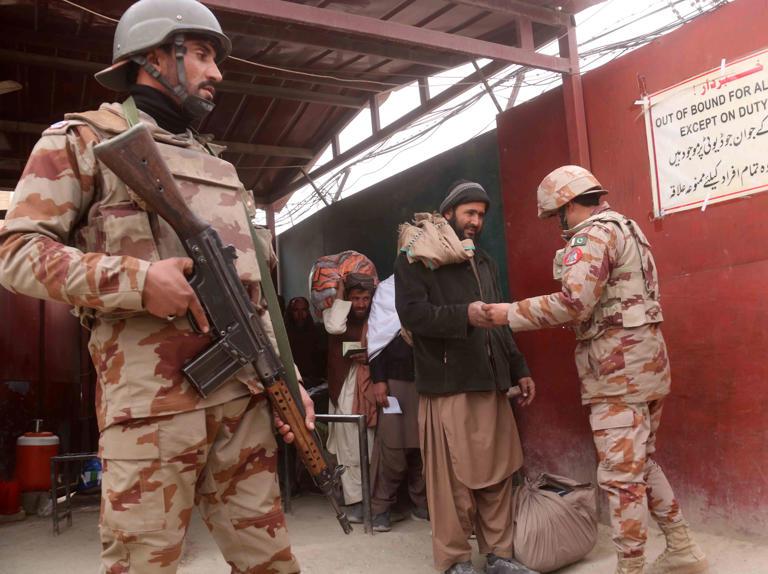
Tensions between Pakistan and Afghanistan escalate amid border clashes
When Kabul fell to the Afghan Taliban in 2021, the head of Pakistan’s intelligence service was one of the first foreign guests to visit the new regime, telling reporters that “everything will be okay.” But less than 3½ years later, relations between Pakistan and Afghanistan have dramatically deteriorated.
In the most severe confrontation between the countries so far, Pakistani airstrikes killed 46 people in eastern Afghanistan in late December, according to the Afghan government. Pakistani officials said the strikes targeted militants of the Pakistani Taliban. The Afghan government said women and children were among the victims of the strikes.
The cross-border escalation reflects growing frustration in Islamabad over the rise in deadly attacks carried out inside Pakistan and attributed to the Pakistani Taliban. Islamabad claims that the group is being sheltered by the Afghan Taliban regime.
Tensions remained high over the past few days, with a cross-border attack from Afghanistan late last month and reports of renewed fighting along the border Friday.
“This is the time to act together for the future of Pakistan,” Pakistani Prime Minister Shehbaz Sharif was quoted as telling Pakistani officials Friday.
Pakistan’s leadership was frequently accused of harboring or tolerating Afghan Taliban leaders and fighters during the 20-year Taliban insurgency in Afghanistan. Now Pakistan finds itself on the other end of a very similar situation.
The victory of the Afghan Taliban in August 2021 energized its Pakistani counterparts and encouraged them to embrace much of the same playbook. At the same time, the fall of Kabul flooded Pakistani weapons markets with modern firearms and night-vision goggles, giving militants an edge over local forces, according to Pakistani officials.
The Pakistan Institute for Peace Studies, an Islamabad-based think tank, said in a report released last week that both “the frequency and intensity of terrorist attacks” have surged since the Taliban takeover of Kabul, reaching levels last year that had not been seen in a decade.
Between 2007 and 2015, Pakistani Taliban militants shocked the world with their assassination attempt on women’s rights activist Malala Yousafzai, their brutal rule over tribal areas, and a string of devastating plots, including a school attack in 2014 that left 132 children dead.
At the time, the Afghan and Pakistani Taliban were believed to frequently collaborate. In a report last year, the United Nations’ Analytical Support and Sanctions Monitoring Team concluded that such links still exist, writing that “Taliban rank and file” and al-Qaeda militants “assisted” the Pakistani Taliban in recent cross-border attacks and supplied weapons and equipment.
In the border region, locals are convinced of such links, too. Maulana Altaf Hussain, a village elder, recalled spotting holes in the border fences after recent suspected incursions of militants from Afghanistan into Pakistan.
But in an interview last year, Qari Shoaib Bajauri, a senior Pakistani Taliban member, said the group’s intentions have evolved. Rather than targeting civilians, he said, the group has focused on its combat with Pakistani forces, which he called “a cancer for this whole region.”
Bajauri denied that the group relies on Afghan fighters, but acknowledged that its ranks include “Pakistani mujahideen who fought alongside the Afghan Taliban in Afghanistan and are now back in Pakistan.”
While some Afghan officials want to maintain cordial relations with Islamabad, the Taliban leadership now appears compelled to publicly rebuke Pakistan over its cross-border strikes in late December. Many in the ranks of the Afghan Taliban view the Pakistani Taliban as brothers in arms, and there is pressure on the regime in Kabul to publicly support the group, analysts said.
“Our people’s will is to provide protection to the people — locals and guests alike,” Khairullah Khairkhwa, the Afghan Taliban’s acting information minister, said in late December. His remarks were widely interpreted as a veiled confirmation that the Afghan government harbors Pakistani Taliban militants as “guests,” echoing the Taliban’s rationale for hosting Osama bin Laden and other al-Qaeda militants in the late 1990s and early 2000s.
“The Taliban wants to remove the stigma that it is being used by Pakistan,” said Afrasiab Khattak, a Pakistani Pashtun nationalist leader.
But options for the Afghan Taliban to confront Pakistan, a nuclear power with one of the world’s largest militaries, are limited.
The presence of the Pakistani Taliban “is increasingly becoming embarrassing for the Taliban authorities, who must have realized by now that the TTP cadres are misusing the ‘guest status,’” said Asif Durrani, Pakistan’s former special representative for Afghanistan, using an abbreviation for the Pakistani Taliban.
The same week that Pakistani airstrikes hit targets in eastern Afghanistan, Durrani’s successor was in Kabul for talks with Sirajuddin Haqqani, the Taliban’s acting interior minister.
“It shows that the Taliban also realizes the importance of dialogue,” said Muhammad Amir Rana, a Pakistani security analyst.
The question in Islamabad, however, is increasingly whether that view is shared across the Taliban regime. While Pakistan is believed to have had historically strong ties with Haqqani, the leader of a key faction within the regime, it is less clear how Pakistan’s messages are received among the reclusive leadership in Kandahar.
“The Haqqanis are important, no doubt,” said Rana, but they “don’t have the ability to control the dialogue or to prevail.”
Source » msn.com





